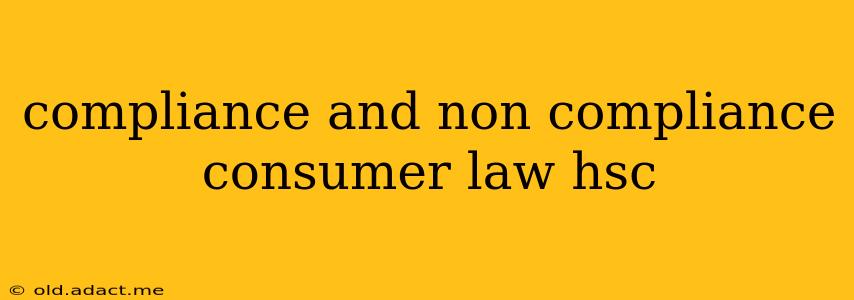The HSC (Higher School Certificate) curriculum often delves into consumer law, exploring the rights and responsibilities of both consumers and businesses. Understanding compliance and non-compliance is crucial for navigating this complex area. This article examines key aspects of consumer law, focusing on the consequences of both adhering to and violating legal obligations.
What is Consumer Law?
Consumer law is a branch of law designed to protect consumers from unfair or deceptive business practices. It covers a wide range of areas, including:
- Sales contracts: covering aspects like warranties, guarantees, and product descriptions.
- Misleading or deceptive conduct: prohibiting businesses from making false or misleading claims about their products or services.
- Unfair contract terms: preventing businesses from including unfair or unreasonable terms in contracts with consumers.
- Consumer credit: regulating loans, credit cards, and other forms of consumer credit.
- Product safety: ensuring products are safe for consumers to use.
Compliance with Consumer Law: The Benefits for Businesses
Businesses that comply with consumer law gain several significant advantages:
- Enhanced reputation and brand loyalty: Consumers are more likely to trust and support businesses that demonstrate ethical and responsible practices. A strong reputation can be a powerful asset, leading to increased sales and customer loyalty.
- Reduced legal risk and financial penalties: Compliance minimizes the risk of facing legal action, costly fines, and damage to reputation. Avoiding legal battles saves time and resources, allowing businesses to focus on growth and innovation.
- Improved consumer relations: By treating customers fairly and adhering to legal standards, businesses can foster positive relationships, leading to increased satisfaction and repeat business.
- Stronger competitive advantage: In a marketplace where consumers are increasingly conscious of ethical practices, compliance can be a significant differentiator, attracting customers who value fair treatment.
Non-Compliance with Consumer Law: The Consequences
Non-compliance with consumer law can have serious repercussions for businesses, including:
- Legal action: Consumers can take legal action against businesses that violate their rights, leading to court appearances, costly settlements, and reputational damage.
- Financial penalties: Government regulators can impose substantial fines and penalties on businesses found to be in breach of consumer law. These can significantly impact a business's financial stability.
- Reputational damage: Negative publicity surrounding non-compliance can severely damage a business's reputation, leading to decreased sales, lost customers, and difficulty attracting investors.
- Criminal prosecution: In some cases of serious misconduct, business owners or employees can face criminal charges, resulting in fines, imprisonment, or both.
What are examples of non-compliance?
Examples of non-compliance include:
- False advertising: Making misleading or deceptive claims about products or services. For example, exaggerating the benefits of a product or omitting important information.
- Unfair contract terms: Including unfair or unreasonable terms in contracts with consumers, such as excessively high penalties for breach of contract or clauses that limit consumer rights.
- Selling unsafe products: Offering products that pose a risk to consumer safety, either due to defects or inadequate warnings.
- Engaging in aggressive selling tactics: Using high-pressure sales techniques or harassing consumers to make purchases.
- Failing to provide adequate refunds or repairs: Refusing to provide a refund or repair for faulty goods or services, despite legal obligations.
How can businesses ensure compliance?
Businesses can ensure compliance through several strategies:
- Developing and implementing robust compliance programs: Establish clear policies and procedures to guide employees' actions and ensure adherence to legal requirements.
- Providing employee training: Educate staff about consumer law obligations and the consequences of non-compliance.
- Seeking legal advice: Consult with legal professionals to ensure business practices are compliant with relevant laws and regulations.
- Regularly reviewing and updating compliance procedures: Consumer laws evolve, so businesses need to adapt their practices accordingly.
- Monitoring complaints and feedback: Actively solicit and address customer feedback to identify and rectify any compliance issues.
What are the common consumer rights?
Consumers have numerous rights protected by law, including:
- The right to safety: Products should be safe for their intended purpose.
- The right to be informed: Consumers should receive accurate information about products and services.
- The right to choose: Consumers should have a choice of goods and services at competitive prices.
- The right to be heard: Consumers should be able to express their concerns and have them addressed.
- The right to redress: Consumers should be able to obtain redress for faulty goods or services.
Understanding compliance and non-compliance in consumer law is vital for both businesses and consumers. Businesses that prioritize compliance build trust, enhance their reputation, and minimize legal risk. Consumers, armed with knowledge of their rights, can effectively advocate for themselves and hold businesses accountable. The HSC curriculum provides a foundation for navigating this complex area of law.
